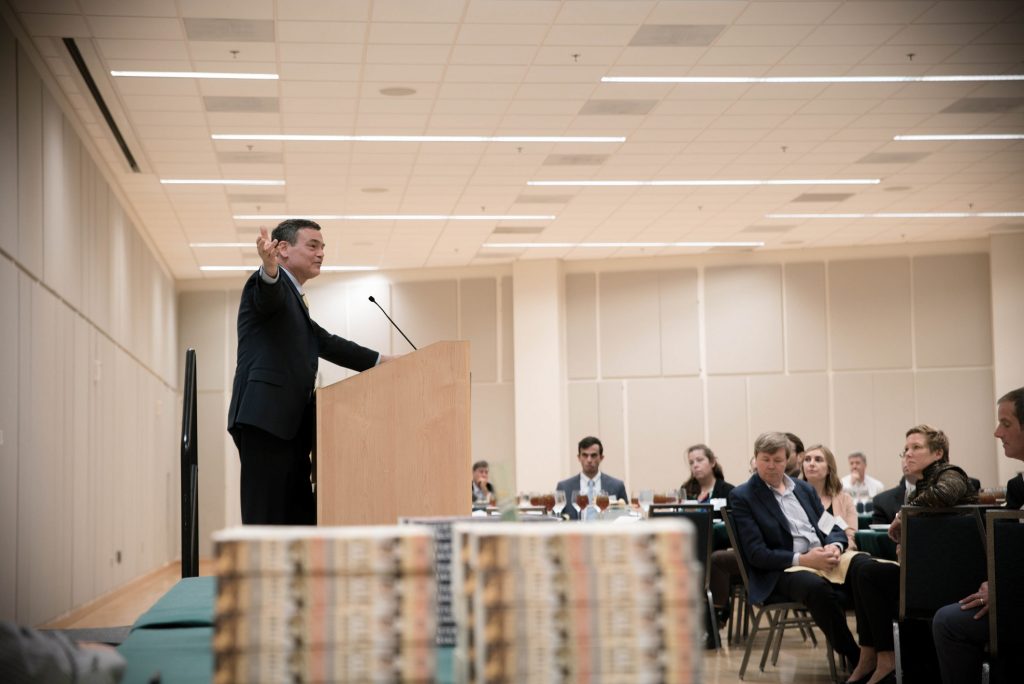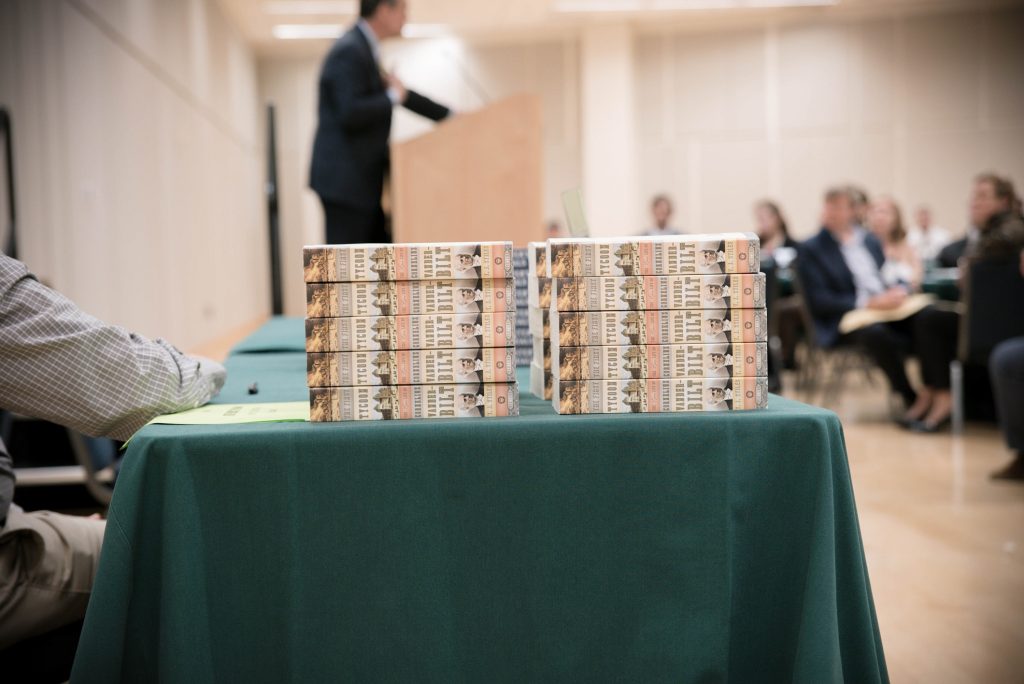This post is one of a series in the #Innovate4Health policy research initiative.
 By Nick Churchill
By Nick Churchill
Malnutrition is one of the greatest global health challenges, particularly with regard to children and pregnant women in developing countries. Undernutrition contributes to nearly half of all deaths among children under the age of 5 and has lifelong consequences for physical and cognitive wellbeing.
Nutriset has confronted the global malnutrition problem head-on by developing a range of innovative nutritional products and using its intellectual property to help developing countries reach nutritional autonomy.
Malnutrition is a blanket term that includes both undernutrition and micronutrient deficiency. An estimated 11 percent of the world’s population, or 815 million people, are undernourished. Undernourished people are particularly vulnerable to disease and death, and both undernutrition and deficiencies in micronutrients can prevent proper growth and development. Undernutrition causes children to underperform in school and makes adults less able to work, perpetuating a cycle of poverty. It can also be deadly. Children suffering from severe acute malnutrition, characterized by very low weight and visible muscle wasting, require urgent treatment to survive.
Severely undernourished patients have traditionally been treated with powdered foods which are dissolved in water before consumption. These powdered products carry risks of dosage errors and bacterial contamination, and they are likely to cause diarrhea in undernourished patients. They also tend to have short shelf lives, particularly in tropical climates.
Nutriset was founded in 1986 by Michel Lescanne with the mission of “focusing on research in the field of humanitarian nutrition, developing innovative solutions and acting as an interface between the worlds of humanitarian aid, nutritionists and food industry technologies.” Since then, Nutriset has developed several therapeutic milks, pastes, and tablets. In 1996, Nutriset partnered with Dr. Andre Briend to create Plumpy’Nut®, the first ready-to-use therapeutic food (or, RUTF) for the treatment of severe acute malnutrition.
This new product was field tested in Malawi by Dr. Mark Manary, who discovered that RUTFs were much more effective than traditional treatments. Dr. Manary was able to clear his hospital’s malnutrition ward and use RUTFs to treat his patients at their homes, while increasing the recovery rate from 25% to 95%. Given the product’s success, Dr. Manary recognized the long-term impact RUTFs could have if they were manufactured in the countries that needed them. Together, the doctors simplified the recipe so it could be produced locally.
 Plumpy’Nut® has a long, 2-year shelf-life, is formulated to avoid diarrhea-type side effects, and can be eaten right out of the packet, eliminating the risks of dosage errors and contamination associated with mixing a powder with water. Plumpy’Nut®’s long shelf-life, effectiveness, and ease-of-use have led to a rise in community-based treatment of acute malnutrition and have made it possible to treat children in areas that were not reached by traditional methods.
Plumpy’Nut® has a long, 2-year shelf-life, is formulated to avoid diarrhea-type side effects, and can be eaten right out of the packet, eliminating the risks of dosage errors and contamination associated with mixing a powder with water. Plumpy’Nut®’s long shelf-life, effectiveness, and ease-of-use have led to a rise in community-based treatment of acute malnutrition and have made it possible to treat children in areas that were not reached by traditional methods.
Nutriset has used its patent rights to further increase access to its technologies in developing countries through its PlumpyField® network. Nutriset partners with local entrepreneurs in franchise-like relationships to create sustainable production systems in developing countries. In addition to benefiting from Nutriset’s reputation and manufacturing experience, network partners are given access to Nutriset’s patents and trademarks. The franchise-like system based on granting rights to use its intellectual property allows Nutriset to ensure that all products being locally produced by network members embody the innovations that actually help those suffering from malnutrition. And by supporting the local manufacture of its innovative products, Nutriset enables its partners to provide jobs to local people, source raw materials from local farmers, and customize the products to address the specific nutritional needs of their communities, while decreasing dependency on foreign organizations.
The PlumpyField® network consists of 9 members based in Central America, Africa, Asia, Europe, and the U.S. While the majority of the products are still manufactured in France and the U.S., members in developing countries continue to increase their production capacity, bringing the network’s total capacity to 117,400 metric tons. In 2016, the network’s products were used to treat nearly 8 million children. Thanks to Nutriset’s focus on incentivizing local capacity, that number will surely rise. According to the United Nation’s Food and Agriculture Organization, increasing local production is one of the best ways of ensuring long-term food security. Nutriset’s success in this endeavor would not be possible without its intellectual property rights.
The story of Plumpy’Nut® and PlumpyField® illustrates the power of intellectual property rights to improve and save lives. Not only do IP rights encourage the development of innovative products, they can be used to implement sustainable solutions to some of the world’s most pressing health challenges.
#Innovate4Health is a joint research project by the Center for the Protection of Intellectual Property (CPIP) and the Information Technology & Innovation Foundation (ITIF). This project highlights how intellectual property-driven innovation can address global health challenges. If you have questions, comments, or a suggestion for a story we should highlight, we’d love to hear from you. Please contact Devlin Hartline at jhartli2@gmu.edu.
 On October 12th and 13th, the Center for the Protection of Intellectual Property (CPIP) hosted its
On October 12th and 13th, the Center for the Protection of Intellectual Property (CPIP) hosted its  Speaking on the distinctions between academic and commercial publishing, Stiles explained that he relies on book sales to expand his audience. He noted that, as a biographer, his books are a unique combination of fact-filled scholarship and non-fiction, artistic prose. It’s a genre of writing that has a broad market, but one with a dwindling number of authors due to diminishing incentives.
Speaking on the distinctions between academic and commercial publishing, Stiles explained that he relies on book sales to expand his audience. He noted that, as a biographer, his books are a unique combination of fact-filled scholarship and non-fiction, artistic prose. It’s a genre of writing that has a broad market, but one with a dwindling number of authors due to diminishing incentives. Stiles warned that when authors lose control of their works, it chips away at the incentives that drive independent creation, thereby silencing important voices. This disregard for the rights of creators is part of a larger problem: the degradation of a social compact and understanding that we should pay for something that we want. It’s a troubling trend that could have disastrous consequences in an age when stolen content is available at the click of a mouse.
Stiles warned that when authors lose control of their works, it chips away at the incentives that drive independent creation, thereby silencing important voices. This disregard for the rights of creators is part of a larger problem: the degradation of a social compact and understanding that we should pay for something that we want. It’s a troubling trend that could have disastrous consequences in an age when stolen content is available at the click of a mouse. This month, Congress introduced a bill that would establish a long-discussed small claims court for copyright disputes. The legislation comes after a House Judiciary Committee
This month, Congress introduced a bill that would establish a long-discussed small claims court for copyright disputes. The legislation comes after a House Judiciary Committee